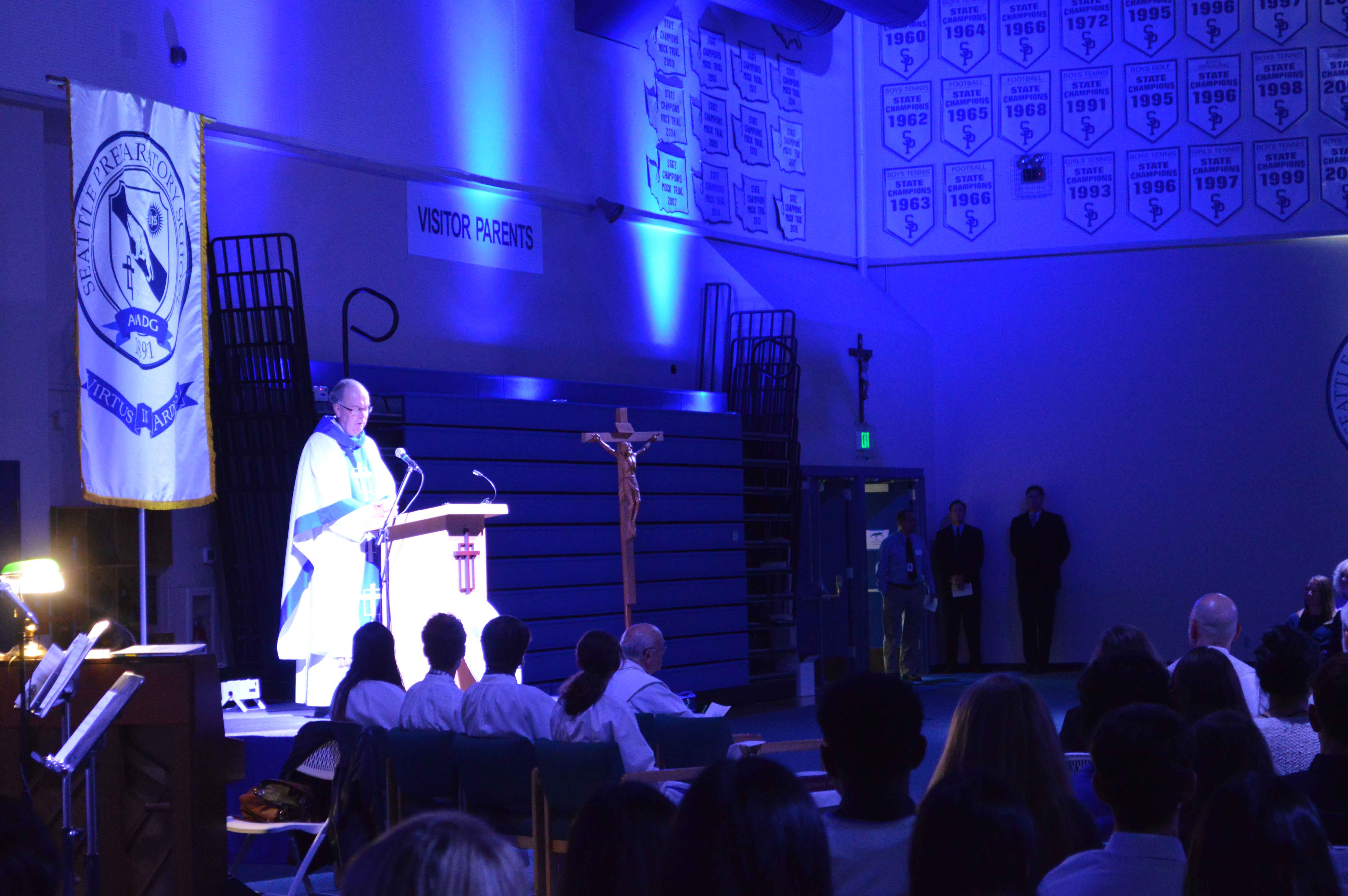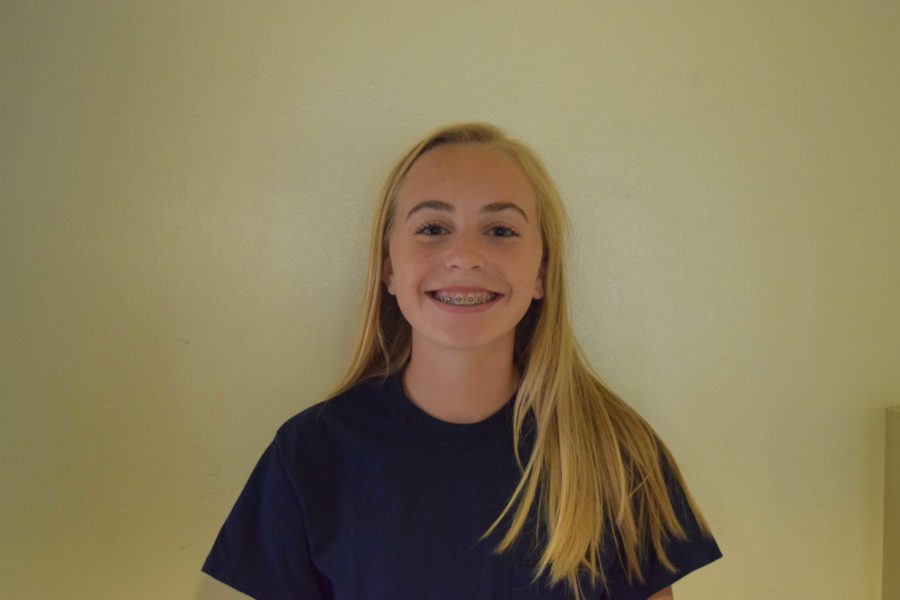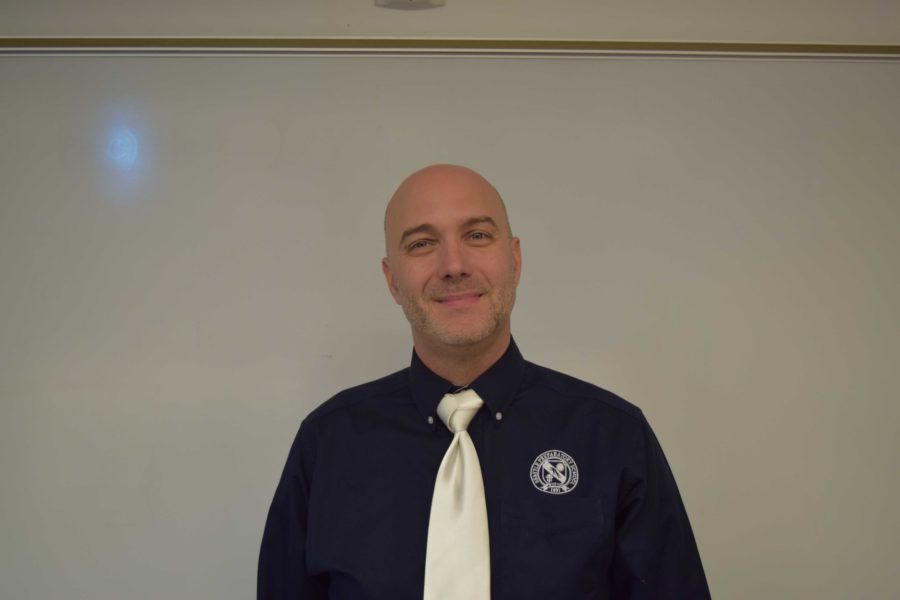Non-Catholics Find Acceptance, Opportunity at Prep
October 27, 2016
What does it mean to be Catholic? To many students, raised in Catholic households, attending mass each Sunday since birth, this is not a question that merits answering. But to a large portion of Prep students, it is a question they are confronted with each day.
73% of Seattle Prep students are Catholic. At a Jesuit school, education is inseparable from Catholic Jesuit teachings. Ad Majorem Dei Gloriam – for the greater glory of God – is Seattle Prep’s slogan. Jesuit ideas like “men and women for others” and “education of the whole person” are commonly used phrases in every class, and both religion classes and all-school masses are requirements. Even in Collegio, history, literature, and religion are interwoven to not only provide a universal view of the human experience, but a distinctly Catholic one.
Seattle Prep is open to students of any religion, but for a Protestant, Muslim, Jewish, Buddhist, or atheist student, is it sometimes difficult to strike a balance at Prep? Is the same true of non-Catholic teachers at Prep?
What is the non-Catholic experience at Prep? What do students really believe? How can teachers and staff deliver Catholic messages without ignoring the diverse population of beliefs in Prep students? With the goal of answering these questions and more, The Panther has taken an in depth look into the experiences of non-Catholic students and faculty at Prep
What’s Your Take?
Gabe Berger ‘17 was raised Catholic, but son to a practicing Jewish father. Berger attends mass almost every Sunday, and temple once a year. To Berger, an atheist, mass is not a begrudging obligation, but rather, “an opportunity to learn.”
“The moral teachings of those stories are still very important to me,” said Berger.
“In family discussions we’ll talk about the message of Passover and Hanukkah.” To him, religion is a jumping off point for moral discussions. Despite his beliefs, he feels that the religious aspect of Prep enriches the learning, rather than restricting it.
Jules Hancock ’18, had a different take. “I find organized religion stifling. I feel no closer to God when I’m sitting in mass surrounded by too many people than I feel in class,” said Hancock, whose mother was Mormon, but left the church because she felt trapped. To Hancock, religion is restrictive, but spirituality is necessary: “I have to believe in something or I’ll go insane.”
This sentiment of “spiritual but not religious” seems to be a popular one at Prep, and one that lends itself to the spiritual, non-specific homilies and reflections of Prep’s religious services. Often, these reflections are given by non-Catholic students and teachers
It’s in the Numbers
Prep’s official data on religion states that 73% of students at the school are Catholic, with the remaining 27% divided up among different religions. The Panther interviewed 25 students from each grade about what their beliefs are.
Asking a student his or her religion is a complicated task, and categorizing beliefs can be even more difficult. A person’s “beliefs” can often be very personal and layered, and while some students replied with a simple “Catholic” or “Atheist,” the most frequently received response was some iteration of: “buckle up, this is going to take a while.”
A strictly categorized data set is not the best for developing the complex questions and musings of so many interviewed, and often students landed somewhere under the canopy of “agnostic.
The truth may simply be that high school is a confusing time, and with so many ideas and influences alive at Prep, having a firm understanding of one’s own beliefs is difficult. Expectations, religion classes, and peer pressure weigh heavily on the teenage mind, and it may be that students have too many activities to spend time developing a secure canon.
Creating the Environment
“I like talking about Catholicism as much as I do Judaism and other religions around the world.” -Grace Jordan ‘19
To Gabe Berger ‘17, religious education at Prep is at its best when it promotes discussion rather than lecture.
“The theology aspects of Collegio have actually had a bigger impact on me than theology classes,” Berger says.
“My experience in Collegio was enhanced by the religious elements. . . I don’t think I would have gotten as much out of our WWI unit if we hadn’t studied just war theory.”
To Berger, religious ideas are best utilized when they can supplement and add to education.
For Grace Jordan ‘19, religion is not a part of her life, but something she is open to: “in Collegio and religion class I think of these classes and the information I learn as a way to possibly connect with God or become religious. . . Because I am still figuring out my religion, I like talking about Catholicism as much as I do Judaism and other religions around the world because I find them interesting”
For Jordan, Prep is a place where she can learn about and experience religion, without any obligation or pressure to believe it.
Fitting In
Many discussions with teachers and students revealed that non-Catholic Prep community members generally feel accepted for their views. Mr. Kendal Bond, a science teacher who grew up Quaker, experienced this acceptance as both a student and now as a teacher.
While attending Seattle University, Bond didn’t go to church very often but occasionally attended mass with friends and had more exposure to different belief systems. He now practices Quakerism a bit and attends University United Church of Christ.
When asked about working at a Jesuit school, Bond explained that in his experience, Jesuit schools were certainly the most open to difference in comparison to non-Jesuit Catholic schools. “At the Catholic schools I’ve taught at that weren’t Jesuit schools, the fact I wasn’t Catholic was palpable and created a different sort of experience. The fact that Seattle Prep is a Jesuit institution has never framed a relationship.”
Bond likes that there are still experiences he can share with Catholic colleagues, and that there are many similarities in values. The words in mass are sometimes just a reminder that it is time to pray, and even if some of the words seem antique to him, he can still connect with his spirituality.
Many atheist or non-religious students have had exclusively positive experiences with Catholicism since their enrollment. Aisha Mounir ‘20 said “I think it’s a good religion. It’s nice.”
Eric Skogland ‘20 said: “If I had a religion that believes in a God, it would be Catholicism.”
And it’s easy to see where this positivity is coming from. As Theology teacher Mrs. McNeill said: “I think we become richer, more full people when we engage with people who have different backgrounds and cultures and different experiences than we do. I think that helps us to become better people and closer to God too because it’s about forming relationships. God’s about relationships.”


